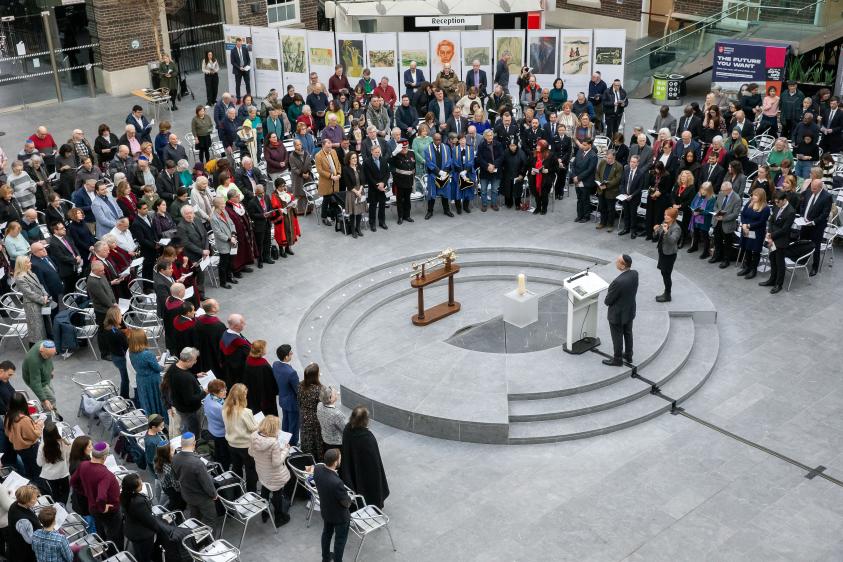
Attendees at Barnet Council's Holocaust Memorial Day service
Barnet Council hosted its annual Holocaust Memorial Day commemoration service at Middlesex University yesterday (Sunday 28 January), bringing together the borough’s multifaith community to remember all victims of genocide.
The theme chosen by the Holocaust Memorial Day Trust for 2024 is ‘Fragility of Freedom’. The 30th anniversary year of the Rwandan genocide was marked as part of the service, which included a speech by Rwanda High Commissioner Johnston Busingye. One million Tutsis were killed in Rwanda during a genocide that lasted 100 days in 1994.
Mr Busingye said: “It is crucial to recognise that freedom is acquired, but although it is acquired, it can be lost if it is not protected. It is earned through struggle and sacrifice. The fragility of freedom becomes evident when things like discrimination, division and hate creep into the fabric of society.
“It is our duty to guard against division, injustice, denial and instead foster unity, reconciliation, justice and accountability. Only then can we create a future where freedom is as lasting and enduring as the commitment that the horrors of the genocide will never again haunt humanity.”
Councillor Liron Woodcock-Velleman said: “Holocaust Memorial Day is an incredibly important event across the world, but particularly here in Barnet, which is where it was established. For me, this is a very public commemoration, but also a personal commemoration. My grandfather survived two concentration camps, three slave labour camps and three ghettos. It’s an important day not just to commemorate ourselves, but also to make sure we’re educating the next generations about the horrors of the Holocaust and what lessons we can learn from it.”
Cllr Woodcock-Velleman’s grandfather, Alec Ward, was imprisoned in Buchenwald and Mauthausen concentration camps, before becoming one of 732 unaccompanied child refugees granted sanctuary in Britain after World War Two. He died in 2018 aged 91.
The Worshipful Mayor of Barnet, Councillor Nagus Narenthira, told service-goers how her brother, Dr Ganesharatnam, was killed during the Jaffna hospital massacre in Sri Lanka in October 1987. She had fled the country with her son to join her husband, Kan Narenthira, in the UK just a few months previously.
She said: “Sri Lanka is slowly recovering from that period in history, but there are still concerns about human rights. Whilst political reform and reconciliation takes place, there is a fragile freedom in existence.
“We have a lot to be grateful for living in a country where democracy is taken for granted, but we should be aware it doesn’t take much for hate to creep in. And if goes unchallenged, there’s a risk that your friends and family could have their freedom restricted or removed. Anyone opposing our freedoms should be challenged.”
Other speakers included Holocaust Educational Trust Chairman Craig Leviton, Interim Vice Chancellor of Middlesex University Professor Sean Wellington, and Leader of Barnet Council Cllr Barry Rawlings. Live music came from the Barnet Band and the Edgware and Hendon Reform Synagogue Choir. Students from Alma Primary placed memorial candles in commemoration of all those who died and suffered during the Holocaust.
Snowdrops were handed out by students from Akiva School as people left the service. Each snowdrop represents a child that died in the Holocaust. So far 66,000 bulbs have been planted in the borough. Barnet plans to continue handing them out until there is one for each of the 1.5million children who died in the Holocaust.
Holocaust Memorial Day is to remember the Jews who died in the Holocaust, along with others who lost their lives to Nazi persecution, as well as people killed during more recent genocides in Cambodia, Rwanda, Bosnia, and Darfur.
